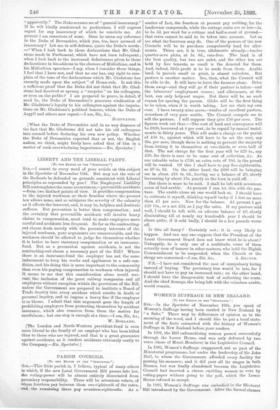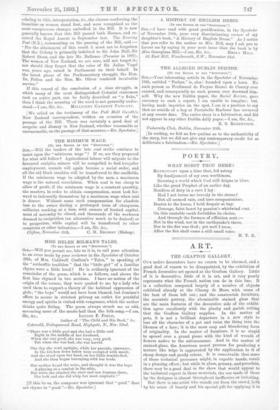WOMEN'S SUFFRAGE IN NEW ZEALAND.
[To THE EDITOR OF TUE " SPECTATOR." ] Sin,—In the Spectator of November 18th, you speak of Women's Suffrage having been carried in New Zealand by " a fluke." There may be differences of opinion as to the• meaning of the word, and I should like to put a brief state- ment of the facts connected with the history of Women's Suffrage in New Zealand before your readers.
In 1891, the Bill enfranchising women passed successfully through the Lower House, and was only defeated by two votes (those of Maori Members) in the Legislative Council.
In 1892, Women's Suffrage reappeared, not as part of the Ministerial programme, but under the leadership of Sir John Hall, to whom the Government afforded every facility for passing his measure; and it did pass all its stages in both Houses, but was finally abandoned because the Legislative Council had inserted a clause enabling women to vote by voting-paper without going to the poll, which the Lower House refused to accept.
In 1893, Women's Suffrage was embodied in the Electoral Bill introduced by the Government. After the formal clauses relating to title, interpretation, &c., the clauses conferring the franchise on women stand first, and were recognised as the most conspicuous changes embodied in the Bill. It is now generally known that this Bill passed both Houses, and re- ceived the Royal Assent in September last. The Evening Post (N.Z•), commenting on the passing of the Bill, said :— " For the attainment of this result it must not be forgotten that the Colony is primarily indebted to Sir John Hall, Sir Robert Stout, and the late Mr. Ballance (Premier in 1891). The women of New Zealand, we are sure, will not forget it ; nor should they forget that the voice of Sir Julius Vogel was, years ago, raised in Parliament on their behalf. In the latest phase of the Parliamentary struggle, the Hon. Dr. Pollen and the Hon. Mr. Oliver rendered invaluable service."
If this record of the conclusion of a close struggle, in which many of the most distinguished Colonial statesmen took an active part, can be fairly described as " a fluke," then I think the meaning of the word is not generally under- stood.—I am, Sir, &a., MILLICENT GARRETT FAWCETT.
[We relied on the testimony of the Pan Mall Gazette's New Zealand correspondent, written on occasion of the passage of the Bill. There was certainly a good deal of surprise and dismay in New Zealand, whether reasonable or unreasonable, on the passage of that measure.—En. Spectator.]







































 Previous page
Previous page